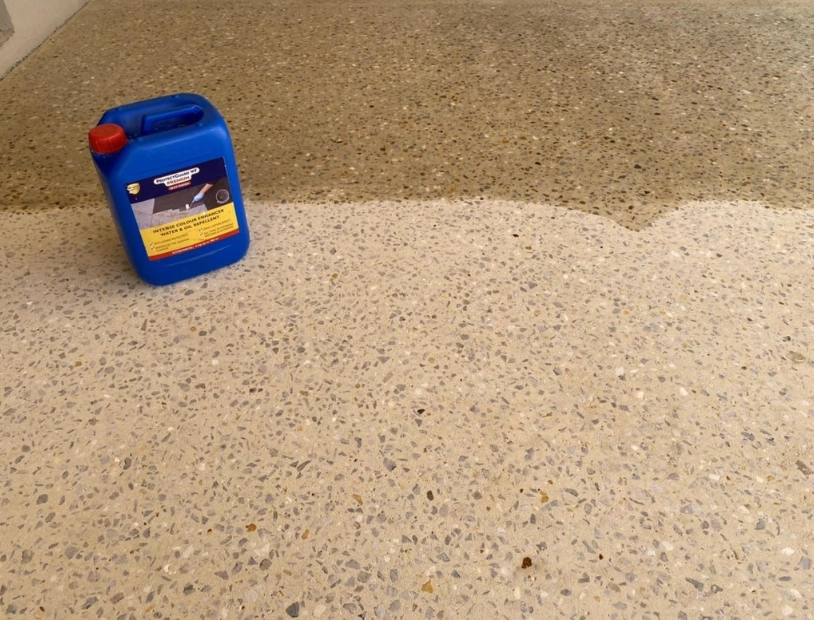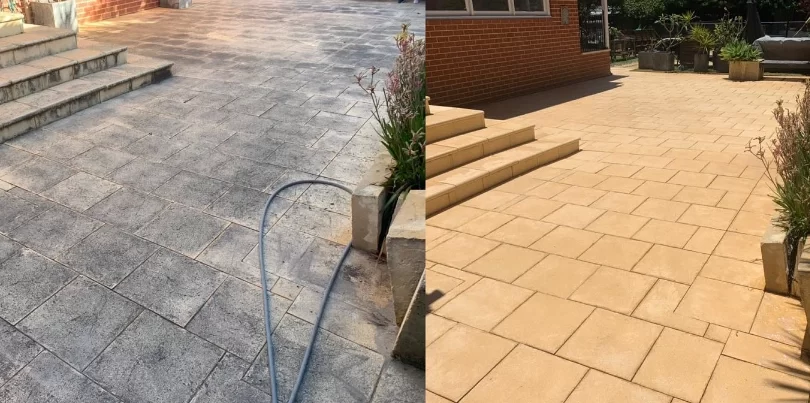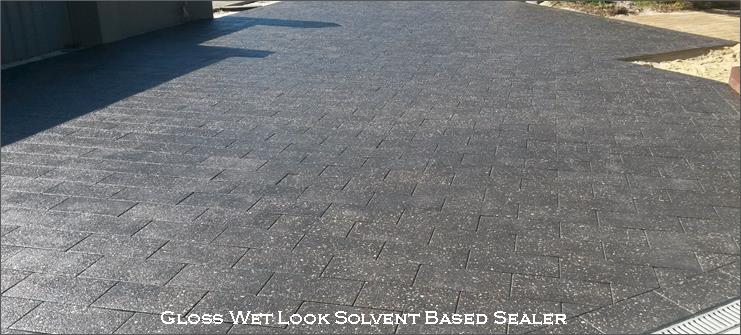Which pavement sealer is best?
The most common question we get asked is, “What is the best pavement sealing option for me?”
Deciding which pavement sealing option to choose can boggle the mind. There are many different brands, as well as many different types. Several factors come into play when selecting a sealer:
- The material your pavement is mainly comprised of.
- How porous the material is.
- Where it is located, and what the area is used for.
The most common types of sealer Mr Blastit recommends and uses to seal pavement are a penetrating water based sealer and a wet look solvent based sealer.
No matter what sealer you choose, the key to getting a good life out of your sealer is taking the time to ensure the pavement is thoroughly cleaned prior to application.
Why not opt for a professional sealing service to get the job done right?
What to consider when sealing pavement
What will the sealer look like once cured?
You’ll first need to decide what you would like the surface to look like once sealed. Different finishes will have different feels underfoot, so consider whether your desired finish is practical for the space. For example, it may not be the best idea to have gloss finish on poolside tiles, when other sealers could provide better grip when wet.
Once you’ve decided on the look it’s a matter of finding the product to match. Don’t be afraid to ask for pictures to really see it in action – especially for special finishes or tints.
What is the life expectancy of the sealer?
There should be some indication of a quality guarantee, or at least how long you can expect the product to provide some level of protection. In harsh Perth conditions you will likely need to reapply earlier than stated on the product information to keep your surfaces fully protected.
Our operators can advise you on the life expectancy for your specific product, on your surface.
Are there any special care requirements?
Sealers are durable once cured (barring reapplication in due time), but you will still need to maintain your surface over time. Caring for sealed surfaces is mostly a case of cleaning up spills, not using harsh chemicals or manual abrasives.
You should pressure clean your pavement regularly. The build-up of wet leaves and plant debris or oil stains will, over time, stain not only the sealer but also the pavement below. It is important to clean a stain off your sealed pavement as soon as you notice it.

Water Based Sealer
Our top selling Penetrating Water Based Sealer is a great all-round product, suitable for driveways, around pools and back patios too. It is a new generation sealer which uses nanotechnology and organic polymers.
Most traditional sealers need the pavement to be totally dry prior to the sealer being applied. However, the water based sealer used by Mr Blastit must be applied to wet pavement.
In fact, the wetter the pavement is, the better it is for the sealer to penetrate and bond with the surface. This factor makes this water based sealing product a great option for sealing pavement during the wetter months of the year.
Pros of a water based sealer:
- Environmentally friendly.
- Resistant to hot tyre marks, motor oil & grease.
- Protects against most chemicals.
- Low odour and a non-offensive smell.
- Penetrates deep into the pavement and gives some level of protection for up to 10 years (however it is recommended to re-seal every 3-5 years to give optimum protection).
- Perfect for around pools; doesn’t make the surface slippery, and protects the pavers from pool salts and chemicals while still allowing pavers to breathe.
- Suitable for all types of pavement: Concrete, exposed aggregate, brick & clay pavers, liquid limestone, granite, Fremantle stone, travertine etc.
- Applied directly after pressure cleaning to wet pavement (thus minimising the disruption to you).
- Cost effective option.
Cons of a water based sealer:
- Limited tints available (less versatility in appearance)
- Not as effective for ‘dark’ wet look finishes.

Solvent Based Sealer
Solvent based sealers are also known as acrylic sealers or wet look sealers. These are less commonly used by Mr Blastit but still have their place in certain applications.
They can give a more intense ‘wet look’ to your pavement, enhance the colour of the pavers and come in a Satin or Gloss finish. Solvent based sealers can be a great finish for exposed aggregate and granite pavement, bringing out both its depth and its colour.
Pros of a solvent based sealer:
- Available in a number of different coloured tints (great for changing up the look of your outdoor area).
- Newer non-slip formulas available which are great for around pools or outdoor areas which can be slippery when wet.
- Some deep penetrating formulas available for better protection against stains.
- Can be very visually pleasing for a more intense ‘wet look’ finish.
Cons of a solvent based sealer:
- Surfaces need to be completely clean and completely dry before a solvent based sealer can be applied, or it may become cloudy or even peel off.
- Longer application time, may take several days depending on the weather.
- Not as cost effective as water based sealers.
- Strong odour upon application.
- Not as environmentally friendly, contains potentially hazardous compounds.
Rest assured that should your surfaces require an acrylic sealer, our operators will take the utmost care to make the application process as safe and convenient as possible.
Still not sure which one is better? We have a whole page dedicated to the difference between water based and solvent based sealers.

Your many sealer options
There are many sealer options available. There is your basic water based sealer, your wet look water based sealer, your tinted solvent based sealers, your solvent based penetrating sealer, a high quality stain repel sealer, sealer for limestone walls & blocks… the list goes on!
If you are unsure of the best option for you, contact Mr Blastit and we will gladly advise you which sealer option we believe would be the best for your pavement.
Please call Mark on 0419 350 332 if you have any queries or questions.
